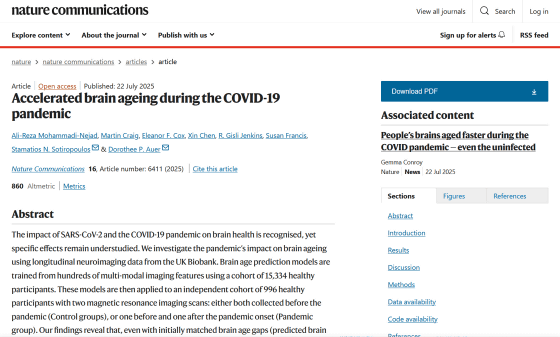Research shows that the COVID-19 pandemic accelerates brain aging in people who are not infected

In addition to symptoms such as coughing, difficulty breathing, fever, and body aches, COVID-19 is known to
Accelerated brain aging during the COVID-19 pandemic | Nature Communications
https://www.nature.com/articles/s41467-025-61033-4

People's brains aged faster during the COVID pandemic — even the uninfected
https://www.nature.com/articles/d41586-025-02313-3
COVID-19 Made Our Brains Age Faster | TIME
https://time.com/7304417/covid-19-brain-effects-aging/
In addition to the threat of COVID-19 itself, which was a new and deadly infectious disease, the COVID-19 pandemic has also had far-reaching effects, such as isolation, disruption of lifestyles, and increased stress, due to social distancing and policies to avoid contact between people as much as possible. However, there have been few studies examining the impact of the pandemic on brain aging.
To investigate the impact of the pandemic on people's brains, a research team from the University of Nottingham in the UK trained a machine learning model on brain scan data collected by the UK Biobank . The model predicts the state of the brain at different ages and calculates a 'brain age gap' by comparing the actual brain scan data with chronological age.
The team then used machine learning models to measure the level of brain aging in 996 people who had undergone two brain scans, at least two years apart. The subjects included a control group who had two scans before the COVID-19 pandemic, and an experimental group who had one scan before and one after the pandemic.

The analysis revealed that the brains of people who experienced the pandemic aged about 5.5 months faster than those who did not, and this accelerated aging was observed not only in people who were infected with the new coronavirus, but also in those who were not infected.
These results suggest that accelerated brain aging may be due to biological and viral factors, as well as factors related to the pandemic itself, such as stress. In fact, it has been reported that changes in
Lead author Ali-Reza Mohammadi-Nejad from the University of Nottingham's School of Medicine said: 'This finding is intriguing and somewhat unexpected. We found that participants who simply experienced the pandemic period showed signs of slightly accelerated brain ageing, regardless of whether they were infected. This suggests that the widespread experience of the pandemic - disruption to daily life, stress, and reduced social interaction and activity - may have had a measurable impact on brain health.'
The pandemic has had a greater impact on some groups of people, particularly men, older people, people in poor health, people with lower education and income levels, and people with unstable housing. For example, people with unstable employment had an average brain age five months older than those with no employment, while people in poor health had a brain age about four months older. However, only people infected with COVID-19 showed a decline in cognitive ability.

The fact that brain aging accelerated during the pandemic, even in people who were not infected with COVID-19, highlights the need to recognize the pandemic's broader health effects beyond the physical indicators that doctors tend to focus on.
'Brain health is affected by our daily lives, and significant societal disruptions like a pandemic can affect even healthy people,' said Mohammadi-Nejad. 'This advances public health understanding and highlights the importance of considering mental, cognitive and social well-being alongside traditional physical health indicators in future crisis response plans.'
Related Posts:
in Science, Posted by log1h_ik







